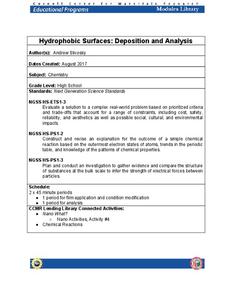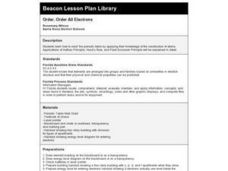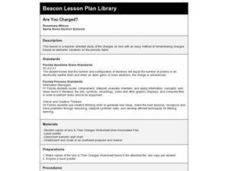Curated OER
Composition of the Atom
Students investigate the structure of the atom and its composition. In this atom structure lesson, students find the area of cut out circles and drop pens into the circles. They count the number of marks in the circles and relate their...
Curated OER
Changes in Nature
The goal of this science lesson is to have youngsters be able to identify the physical and chemical changes in the carbon cycle, and water cycle due to weathering. The in-class inquiry/experiment is quite interesting and easy to...
Curated OER
Atomic Structure and Ionic Bonding (A Visual Approach)
Using toothpicks, marshmallows, and round colored sticky dots, physical science enthusiasts build models of an atomic nucleus. In this eighth grade chemistry lesson plan, they play an atom-naming game with the models that they have...
Kenan Fellows
Determining the Atomic Mass of Elements in a Compound Using Matrices
Scholars apply concepts learned in both Algebra II and Chemistry to answer the questions on the provided worksheet. The activity allows for extra practice in both classes and helps connect concepts usually taught in isolation. The...
Curated OER
# 21 Measuring Nitrate by Cadmium Reduction
Students design an experiment to evaluate the effects of various treatments on the nitrogen cycle in a freshwater aquarium. They are required to maintain a laboratory notebook of all work, measure the key analytes of the biosystem at...
Chemistry Teacher
Metals, Nonmetals, and Metalloids Lab
What an exciting way to introduce your blossoming chemists to the world of metals, nonmetals, metalloids, and polymers! Here is a lab activity that is designed to allow pupils the opportunity to visualize the reaction of metals,...
Cornell University
Hydrophobic Surfaces—Deposition and Analysis
Couches, carpets, and even computer keyboards now advertise they are spill-resistant, but what does that mean? Scholars use physical and chemical methods to coat surfaces with thin films to test their hydrophobic properties. Then they...
Curated OER
Clay Atoms-Taming Our Fear Of The Invisible
Young scholars create atoms with clay by using different colors to represent the protons, neutrons and nucleus. In this creative lesson students use clay to learn about atoms and see how they apply to the periodic table.
Curated OER
The Carbon Cycle
Fifth graders examine the carbon cycle, periodic table, and photosynthesis and respiration. They analyze the periodic table and how it is organized, then complete the "Elementary, Dear Watson" worksheet. Students then examine a carbon...
Curated OER
Doing Lewis Dot Diagrams
Students observe the periodic table and draw the Lewis Dot Diagram. In this investigative lesson students construct information on several elements including the Lewis Dot Formation and take a quiz on the information they learned.
Curated OER
Order, Order All Electrons
Students read the periodic table and apply their knowledge of the construction of atoms. They demonstrate reading the electron configuration of an element on the periodic file.
Curated OER
Elements and Compounds
Eighth graders explore the chemical and physical properties of a variety of elements in a lab setting. They organize the data they collect onto a spreadsheet and then choose one element from the periodic table to research. They...
Curated OER
Electronegativity
Young scholars identify the type of bonding between two atoms of elements given their electronegativity values. They study the trend of electronegativity across the periodic table in small groups.
Curated OER
Students Get Animated: Make Existing Lessons Move and Motivate Students
Students study the chemical elements in a computer generated cartoon format. In this computer animation and chemistry lesson, students learn how to animate using computer programs. Students use animation to learn about the Periodic Table...
Curated OER
Are You Charged?
Fourth graders study the charges on ions and familiarize themselves with a quick way to remember charges based on location of elements on the periodic table. They complete a worksheet and share their answers with the class.
Curated OER
Isotopes of Pennies
Pupils demonstrate that isotopes of an element have different masses. They illustrate atomic mass and neutrons. The periodic table is examined in length. Display of a collection of atoms is surveyed.
Curated OER
Metals, Non-metals, Metalloids
Students discuss the physical and chemical properties of metals and non-metals. As a group, they classify items as a metal or non-metal. Using the periodic table chart, students discuss the characteristics of each metal. Based upon...
Curated OER
Getting Animated
Learners create a simple animation illustrating a chemical element in the periodic table. In this chemistry lesson plan, students create a new way to describe elements by using them in an artistic form.
Curated OER
Crystals: What Are They and What Holds Them Together
Students are introduced to the characteristics of crystals and what keeps them together. Using the Periodic Table, they examine the various elements and develop a model of an atom. In groups, they place sugar and salt in petri dishes...
Curated OER
The Interactive Periodic Table of the Elements
Students study the different types of metals. In this investigative lesson students watch a demonstration on the effects of temperature on atoms and take a tour through baone matter.
Virginia Department of Education
Metals, Nonmetals, and Metalloids
How can one easily classify metals, nonmetals, and metalloids? Pupils answer this question as they experiment with unknown substances and perform tests on conductivity, brittleness, and malleability to determine which unknown belongs in...
Virginia Department of Education
Properties of Compounds and Chemical Formulas
Young chemists have unknown compounds they need to sort. Performing three different tests on each, the chemical behaviors they observe become the basis for data analysis.
Virginia Department of Education
Matter and Energy: Equations and Formulas
Using simple materials, an informative lesson demonstrates the Law of Conservation of Matter and explains how to balance chemical equations. Young chemists perform experiments, analyze reactions, and balance chemical equations on their...
Curated OER
Fighting Corrosion to Save an Ancient Greek Bronze
Study corrosion on bronze statues with a hands-on lesson plan. As pupils place a penny in water with salt, they observe the changes in the penny throughout a period of a week. They then analyze the pre-conservation and the...

























